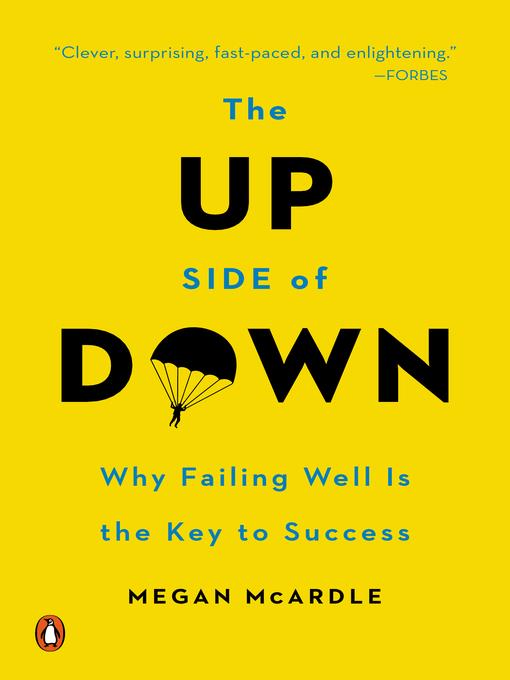
The Up Side of Down
Why Failing Well Is the Key to Success
کتاب های مرتبط
- اطلاعات
- نقد و بررسی
- دیدگاه کاربران
نقد و بررسی

November 25, 2013
In her first book, McArdle, a Bloomberg View columnist and author of the blog Asymmetrical Information, presents a thought-provoking study of failure—our greatest fear and greatest motivator. McArdle’s lively prose underscores an entertaining roster of tales of risk-taking, all the way from the production of Titanic, the highest-grossing movie in history, to welfare reform. Productive failure, as described here, is characterized by intentionality; accidents are not failures. McArdle’s one stumble is her chapter-long digression into a grievance-filled tale of her mother’s hospitalization and the mismanagement of her care. She charges back with examples from her own life—getting a job with the Economist after two years of unemployment—and from companies, like GM, that have needed to accept failure as an instigator of change. Take a tip from 12-step programs, she advises; you have to recognize you have a problem before you can change. Her advice is important not only for individuals, but for wider economic growth; society has to reward experimentation, risk-taking, and working outside our comfort zones. This funny, cheerful look at helping teams overcome failure and find room to experiment will be a boon to business readers. Agent: Gail Ross, Ross Yoon Agency.

January 15, 2014
An illuminating look at the psychology behind rebounding from defeat. "Failure can be the best thing that ever happened to you (though it may sometimes feel like the worst)," writes Bloomberg View columnist and blogger McArdle, who has found a humble, intelligent way of infusing positivity and opportunity into personal losses. The author, a self-admitted "Mozart of misfortune, the Paganini of poor luck," adroitly examines the many facets of the spirit-crushing failure and rebound synthesis--from welfare reform to the blame game and debt forgiveness. McArdle states her points in prose saturated with a self-effacing lightheartedness, lending levity to the crestfallen reality of loss. A detour into her mother's disastrous treatment for a ruptured appendix, however, feels odd when buttressed against chapters on the government bailout of General Motors and the art of self-identifying a recurring problem. Especially noteworthy is the fact that McArdle's observations are not the thoughts of a detached outsider. The author has indeed been in the trenches of disappointment and disillusionment and gets personal in later chapters describing her hard-knocks ordeal fighting the depressive effects of being ill-qualified for a corporate job and then spending months on unemployment ("It is difficult to communicate the progressive corrosion of long-term unemployment to someone who has not endured it"). McArdle's message is a significant one with both personal and economic impact: There can be no vast success without initial failures, and it's important to foster a culture of risk-takers who embrace experimentation in working outside of their comfort zones. Mistakes are learning tools for the greater good of society, she advises, and they should not inherently be classified as failures. Sage counsel on how to learn from failure with humor and grace.
COPYRIGHT(2014) Kirkus Reviews, ALL RIGHTS RESERVED.

September 1, 2013
You fail, I fail, businesses fail all the time. McArdle, special correspondent for Newsweek/The Daily Beast (wonder where that's going, speaking of failing), argues that failure is not so bad and that in fact America benefits from a distinctive ability to let both people and companies fall apart and pick themselves up again. Her 15,000 Twitter followers will be interested.
Copyright 2013 Library Journal, LLC Used with permission.

January 1, 2014
Columnist McArdle (Bloomberg View; author, Asymmetrical Information blog; the Economist; the Daily Beast/Newsweek) offers a substantial analysis of how to gain inspiration from failure. Her counterintuitive view is that defeat is an experience that can reveal worthy insights and that success cannot be achieved simply by not failing. Drawing on a variety of research from such fields as psychology, medicine, anthropology, social psychology, economics, and business, she presents a lively discussion about the fundamentals of failure, the culture of nonsuccess in free markets, how high-risk takers deal with inadequacy, what medical trauma teams can teach about imperfection, business crises, addictive behaviors, classic American attitudes toward blame for failure and the accompanying punishment, with a sobering view of forgiveness. Blended throughout are the author's own experiences. While McArdle is not suggesting that American business commit to defeat in order to learn, her ideas do provide an absorbing and valuable understanding of how to maximize positive outcomes of what might otherwise be wasted learning opportunities. VERDICT Focused on organizations and businesses, McArdle's analysis nicely complements the individual focus found in Ryan Babineaux and John Krumboltz's Fail Fast, Fail Often: How Losing Can Help You Win. Highly recommended for all libraries supporting business and the human sciences curriculum. [See Prepub Alert, 8/12/13.]--Dale Farris, Groves, TX
Copyright 2014 Library Journal, LLC Used with permission.

























دیدگاه کاربران